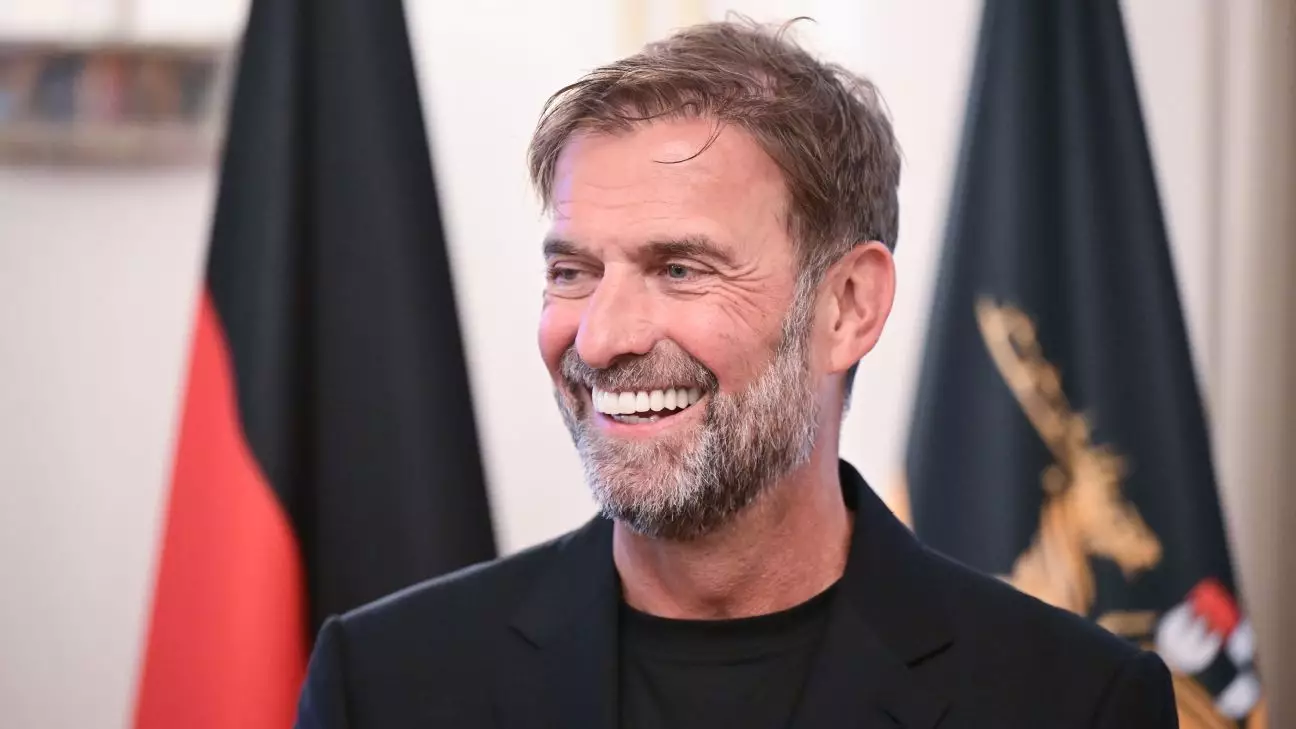It has been nearly ten years since Jürgen Klopp exited the German football scene, yet his presence remains omnipresent. The charismatic personality, known for his infectious laughter and humble demeanor, is an unlikely ambassador of various brands. Klopp’s face is synonymous with joyful moments in Germany, frequently seen promoting everything from automobiles to exercise bikes, leaving an indelible mark on German pop culture. His return to football, this time with Red Bull, has sparked both intrigue and backlash.
Klopp’s recent appointment as “global head of soccer” at Red Bull has raised eyebrows among football purists in Germany. While some might regard this as an exciting new opportunity, for many fans, the association with Red Bull is perplexing. The company’s controversial entry into football through the acquisition of RB Leipzig has earned it a reputation that diverges significantly from the romantic ideals traditionally celebrated by German football supporters. Associated with corporate exploitation in sport, fans struggle to reconcile Klopp’s affable persona with the corporate giant he is now tied to.
Red Bull’s controversial ownership structure, designed to circumvent Germany’s “50+1” rule—demanding that club members hold the majority of shares—positions it antagonistically in the eyes of many loyal followers of the game. Thus, Klopp’s move appears counterintuitive, leading many to question his motivations.
The reaction to Klopp’s switch has starkly contrasted with how such a move would typically be viewed in England. In the UK, gratitude often surfaces when a figure of Klopp’s stature transitions to new ventures; the prevailing sentiment is one of support, as if they have earned the right to pursue their passions. In Germany, however, sentiment tends to skew critical, exposing deeper societal attitudes toward commercialism in sports. Klopp’s decision poses a deep conundrum for fans who viewed him as one of their own.
While Klopp embraces the challenge with enthusiasm, the majority of German followers remain skeptical. A recent poll suggested that a staggering 72% disapproved of his move, as highlighted by coverage in respected publications like Kicker. This skepticism is exacerbated by deeper cultural divides surrounding the evolving landscape of football in Germany—obsessed with maintaining its community-focused core—compared to the more commercial approach prevalent in countries like England.
Despite the backlash, some influential figures in German football wave a flag of support for Klopp’s decisions and the ambition of Red Bull. Former Eintracht Frankfurt sporting director Fredi Bobic articulated the professional structures that Red Bull brings to the table, suggesting that traditionalists could benefit from adapting to a new reality. His comments reflect an ongoing cultural tug of war, where tradition confronts the alluring prospects of modern football.
There is an undeniable appeal in Klopp’s role that transcends mere finances; it offers the opportunity to influence a global network of clubs, including RB Leipzig and RB Salzburg—both nurtured by former colleagues. This opportunity speaks to Klopp’s ambition and desire for growth within the sport. Although patience for the Red Bull alliance may be thin among fans, those who understand the complexities of modern football acknowledge the potential for Klopp to drive the brand towards a more palatable perception.
Continued Evolution of German Football
In parallel with Klopp’s evolving narrative, the German national team has witnessed a renaissance under Julian Nagelsmann. His successful management has provided stability and creativity often absent from previous campaigns, illustrating how football’s cultural dynamics can shift. Nagelsmann’s branding of the national side indicates that innovative approaches can yield results—an art that Klopp now hopes to replicate at a corporate level.
While some traditionalists resent the encroachment of commercial sentiments into football, the performance-oriented ethos of Nagelsmann’s realm offers a message of hope and adaptability. As German football continues to redefine itself on the international stage, balancing commercial realities with cherished traditions is paramount.
As Jürgen Klopp embarks on his new venture with Red Bull, the intersection of personal ambition and public perception will be critical. His transition raises questions that reflect a growing divide within football—one that balances the thrill of modernity against time-honored values. In positioning himself at Red Bull, Klopp embraces a difficult challenge: to remain true to his roots while advocating for an entity that has polarized German fans. As the football landscape continues to evolve, where Klopp’s journey leads remains to be seen. What is clear, though, is that his next chapter will be anything but conventional.

Leave a Reply